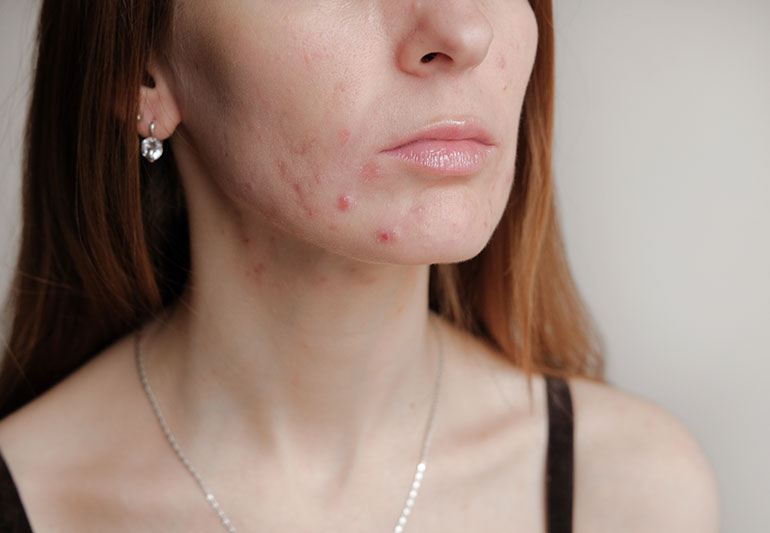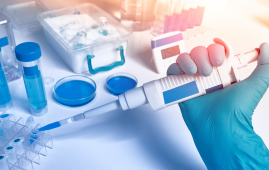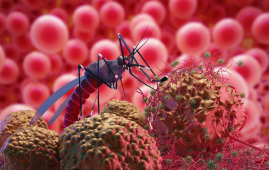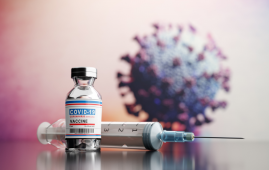

A quick look in the mirror reveals another acne breakout. You’re over 25, so what gives? There are a number of things that might be the culprit, but you wonder: Could a thyroid problem be to blame?
“Acne vulgaris is the medical term for chronic inflammation of the hair follicles in your skin. Dead skin cells, oil and bacteria block the follicles,” says endocrinologist Alexandra Mikhael, MD. “While there are many reasons acne develops, the leading cause of post-adolescent acne is hormone imbalance.”
Because the thyroid is your body’s hormone team captain, many have made the connection between the thyroid and acne. Dr. Mikhael examines whether it’s fact or fiction.
Can hypothyroidism and other thyroid problems cause acne?
Located at the base of your neck, the thyroid is a small butterfly-shaped gland with a big role. It’s responsible for secreting the hormones that control your metabolism, which is how your body uses energy. And it also regulates skin function, such as how much oxygen the skin absorbs.
“The skin is one of the first organs where thyroid hormone imbalances start to show. That’s why dermatologists often suspect thyroid disorders when people have certain skin conditions, such as alopecia and vitiligo,” notes Dr. Mikhael. Alopecia is when your hair falls off in patches. Vitiligo is when you lose pigment cells, so your skin can look discolored in places.
“But acne vulgaris isn’t usually one of the skin conditions related to thyroid disorder,” she adds. “Thyroid hormones can affect the hair follicles, but there isn’t any evidence that thyroid hormone levels cause acne.”
Hypothyroidism, which is an underactive thyroid, can lead to dry skin, for example. “If you have dry skin, debris might accumulate,” Dr.Mikhael says. “It could clog pores and lead to acne. However, acne is not a typical symptom of hypothyroidism.”
Can thyroid medications cause acne?
Dr. Mikhael says that thyroid medications don’t typically cause acne either unless you’re allergic to an ingredient they contain. But some acne medications can affect thyroid tests. For example:
Retinoids: Certain types of retinoids can cause abnormalities in your thyroid-stimulating hormone (TSH).
Isotretinoin: “We sometimes prescribe oral isotretinoin for severe acne. It may cause alterations in thyroid function tests, including higher TSH and lower levels of the thyroid hormones T3 and T4.”
So now that your thyroid is off the hook for causing your acne breakouts, what IS the cause?
It could be several things — changing hormone levels, makeup products you use, a medication side effect, stress or simply too much oil. “Cleaning your face twice a day, putting on proper moisturizing lotions and avoiding pore-clogging makeup should help prevent it,” suggests Dr. Mikhael.
Talk to your healthcare provider or a dermatologist about the best way to treat these unwanted facial guests.
more recommended stories
 ChatGPT Excels in Medical Summaries, Lacks Field-Specific Relevance
ChatGPT Excels in Medical Summaries, Lacks Field-Specific RelevanceIn a recent study published in.
 Study finds automated decision minimizes high-risk medicine combinations in ICU patients
Study finds automated decision minimizes high-risk medicine combinations in ICU patientsA multicenter study coordinated by Amsterdam.
 Study Discovers Connection Between Omicron Infection and Brain Structure Changes in Men
Study Discovers Connection Between Omicron Infection and Brain Structure Changes in MenA recent study in the JAMA.
 Advancing COPD Prognosis: Deep Learning Models
Advancing COPD Prognosis: Deep Learning ModelsResearchers conducted a meta-analysis in a.
 4 in 1 Test for Swine Flu, COVID-19, RSV, and Influenza
4 in 1 Test for Swine Flu, COVID-19, RSV, and InfluenzaIn the United Kingdom, the first.
 Innovative Zika Virus Defense: Needle-Free Vaccine Patch
Innovative Zika Virus Defense: Needle-Free Vaccine PatchTo protect individuals from the potentially.
 Social Media Impact on Mental Health Treatment
Social Media Impact on Mental Health TreatmentAccording to research, social media might.
 Unveiling the Impact of Whole Grain Consumption on Slowing Memory Decline in Black Populations
Unveiling the Impact of Whole Grain Consumption on Slowing Memory Decline in Black PopulationsConsuming a diet rich in whole.
 $1 Cancer Treatment: Engineered Bacteria Breakthrough
$1 Cancer Treatment: Engineered Bacteria BreakthroughWhat if a single one-dollar dose.
 Pfizer COVID Booster: Half-Dose, Reduced Side Effects
Pfizer COVID Booster: Half-Dose, Reduced Side EffectsIn a recent report in The.

Leave a Comment